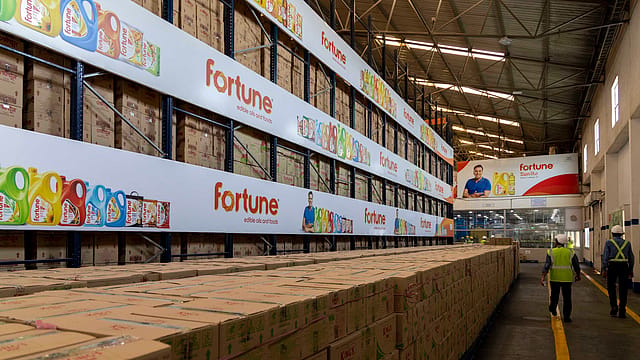Adani Wilmar Q4 profit tumbles 60% on falling edible oil prices; revenue slips 7%
ADVERTISEMENT

Adani Wilmar, one of the country’s leading fast-moving consumer goods companies, on Wednesday reported consolidated profit after tax (PAT) of ₹93.6 crore for the fourth quarter ended March 2023, down 60% year-on-year from ₹234.3 crore in the same period last year. The bottom line growth was impacted by high-cost inventory in a falling edible oil price environment, inflation impact on operational costs and an increase in interest costs due to rate hikes.
During the quarter under review, the company's consolidated revenue dropped 7% to ₹13,873 crore from ₹14,917.3 crore in the corresponding period last year, impacted by a fall in edible oil prices.
On the operating front, EBITDA (Earnings before Interest, Taxes, Depreciation and Amortisation) fell 16% to ₹359 crore as against ₹426 in March quarter of FY22.
For the full financial year 2022-23, the consolidated profit stood at ₹582 crore, registering a decline of 28% from ₹804 crore in the previous fiscal. Revenue grew 7% to ₹58,185 crore in FY23 as compared to ₹54,155 crore in the last financial year, while the EBITDA dipped 4% to ₹1,661 crore from ₹1,736 crore in FY22.
In Q4 FY23, Adani Wilmar recorded 15% sales volume growth at 1.49 million metric tonnes (MT) compared with 1.29 million MT in the same period last year. For FY23, the volume growth was 14% at 5.47 million MT as against 4.80 million MT in the year-ago period.
Segment-wise, the food business doubled its revenue to ₹4,053 crore, with both wheat flour and rice businesses crossing ₹1,000 crore in revenue in FY23, the company said in the BSE filing. This segment contributes to 16% of the total revenue.
The edible oil, which contributes to 61% of total revenue, posted revenue of ₹46,104 crore in FY23. Overall segment volume grew by 3% YoY to 3.36 million MT during the year.
Industry essentials business posted revenue of ₹8,028 crore in FY23 versus ₹6,192 crore in FY22. In terms of volume, it stood at 1.22 million MT compared to 0.91 million MT in the last fiscal. This segment constitutes 22% of the total revenue.
“H1’23 witnessed multiple macro events causing high volatility in edible oil prices, with record high prices in Q1 and subsequent crash of prices in Q2. In H2’23, prices have been gradually declining, reaching lower levels, and leading to better demand trends in the second half of the year. Food prices also witnessed high inflation in H1, which started cooling off in the second half,” Adani Wilmar said in the filing.
Angshu Mallick, MD & CEO, Adani Wilmar Limited said: “A large market opportunity in India is translating well into our growth numbers…This journey in food products has only just begun for us. In edible oil, branded sales, with 75% saliency, we have done significantly better with 8% YoY volume growth in FY23. In the Industry essentials segment, we made good progress with our forward integration plans in specialty chemicals.”
Reacting to Q4 numbers, Adani Wilmar shares closed 3.97% lower at ₹399 on the BSE. During the session, the FMCG stock hit an intraday high and low of ₹419 and ₹390.1, while the market capitalisation stood at ₹51,857 crore at the end of the day.
Founded in 1999, Adani Wilmar is a 50:50 joint venture between billionaire Gautam Adani-led Adani group and Singapore’s Wilmar group. This is one of the youngest among the large FMCG companies with revenue of ₹58,185 crore and sales of 5 million metric tonnes during FY23.